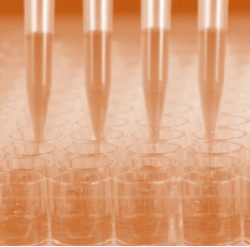Human embryonic kidney 293 (abbreviated HEK 293 or HEK cells) are a cell line that was originally cultured from the kidney cells of a human embryo placed in tissue culture. These cells were transformed with sheared adenovirus DNA in a laboratory in Leiden, the Netherlands. Later research showed that the transformation was affected by a 4.3 kilobase insert from the viral genome, which was incorporated into human chromosome 19. HEK293 cells have a modal chromosome number of 64, and a complex karyotype, with two or more copies of each chromosome, including three copies of the X chromosome.
HEK293 Transfection
HEK293 cells are easy to grow in culture and transfection kits are commercially available. Thus, HEK293 is an excellent cell line to use in transfection experiments or to produce recombinant DNA or gene products. This has made them a popular research tool in cell biology studies and an ideal cell line for therapeutic protein and virus production by the biotechnology industry. However, because the cells were not properly characterized before their transformation with adenovirus 5, it is not known whether they are a fibroblastic, endothelial, epithelial or some other type of cell. For this reason, HEK293 cannot be used as an in vitro model for kidney cell studies. And, because they are an experimentally transformed cell line, they cannot be used as an in vitro model for normal cells.

A particularly transfectable variant of HEK293 contains the SV40 large T-antigen, which allows for substantial replication of transfected plasmids containing the SV40 promoter by the T-antigen. Chinese Hamster Ovary Cells (CHO Cells) is another cell line with a genome coding for the T-antigen.
Transfection experiments using HEK or similar cells include adenoviral vector propagation studies, studies on the effects of drugs on cellular channels, RNAi studies, protein and protein interaction studies and in vitro cell signaling studies. 293 and 293 T can also be used to produce lentiviral and retroviral vectors.
HEK293 Cell Transfection Protocol
A pre-optimized HEK293 Transfection Kit is available from Altogen Biosystems, which includes:
- HEK293 Transfection Reagent (0.5 ml / 1.5 ml / 8.0 ml)
- Transfection Enhancer (0.5 ml), and
- Complex Condenser (0.5 ml)
The kit is optimized to transfect plasmid DNA, miRNA or siRNA either as a standard or reverse transfection. The protocol for a 24-well transfection reaction with HEK293 cells is here:
- Plate 10,000-15,000 HEK293 cells per well in 0.5 ml of complete growth medium 12-24 hours prior to transfection
- Wash with 1xPBS and add 0.5 ml of fresh growth medium
- Prepare transfection complexes by mixing 40 µl of serum-free medium, 4.5 µl of transfection reagent, and (referred to a final volume including growth medium)
- 500 ng DNA (or mRNA), or
- 30 nM – 50 nM of siRNA (or microRNA)
- Incubate transfection complexes at RT for 15-30 minutes
- Optional: Add 2 µl of Complex Condenser. This reagent increases transfection efficiency by reducing the size of transfection complex; however, it may increase cell toxicity
- Add prepared transfection complexes to 0.5 ml of complete growth medium with HEK293 cells (from step 2)
- Incubate cells at 37ºC in a humidified CO2incubator
- Assay for phenotype or target gene expression 48-72 hours after transfection
Optional: Adding Transfection enhancer reagent can increase transfection efficiency. Add 2 µl of Transfection Enhancer reagent 12-24 hours after transfection
If the viability of HEK293 cells being transfected is affected at 16-24 hours post-transfection, changing the growth medium and eliminating redundant exposure of cells to transfectant can reduce the level of cytotoxicity
Links
Purchase HEK293 Transfection Reagent
In Vivo Transfection: Methods, Protocols, Reagents
Transfection. Cells and Molecular Biology Research Methods, Protocols, and Lab Techniques
HEK293 Research
- Transport of norepinephrine (NE+) by transport molecules: This study used HEK 293 cells stably transfected with a gene for a human NE+ transport molecule. A series of studies were then conducted on the cells using voltage-clamp methodology to track the sodium currents in the transfected cells, and their dependency on NE+ in the presence of cocaine and antidepressant molecules. [LINK]
- Evaluation of genomic changes in HEK 293: To improve understanding of recombinant protein production in HEK 293, this study compared stable transfected HEK 293 cells and non-transfected HEK 293 cells on a genomic basis. Downregulation was observed in broad cellular function genes, possibly to free resources for recombinant protein production. In addition, an increased amount of genes associated with stress in the endoplasmic reticulum indicated some effect on protein folding and assembly. [LINK]
HEK293 Cell │ HEK293 Cell Culture │ Transfection Information │ HEK293 Transfection Reagent